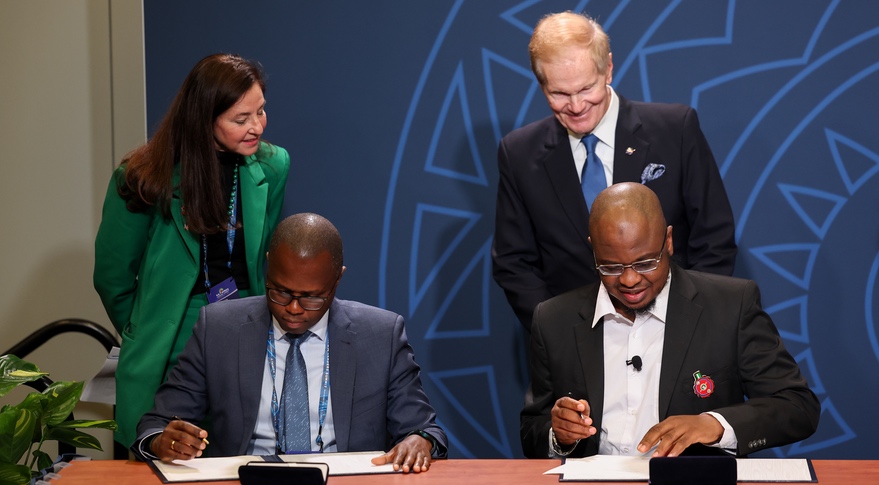WASHINGTON — Two African countries became the first from the continent to join the Artemis Accords as the United States works to bring more emerging space nations into the agreement.
During the Space Forum portion of the U.S.-Africa Leaders Summit here Dec. 13, NASA Administrator Bill Nelson announced that Rwanda and Nigeria would sign the Accords, making them the latest nations to sign the document that outlines best practices for safe and sustainable space exploration based on the Outer Space Treaty and other agreements.
“I’m so proud of Rwanda and Nigeria that they will be the 22nd and 23rd signatories of the Artemis Accords and first two African nations to sign,” he said.
Isa Ali Ibrahim, minister of communications and digital economy, signed the Accords for Nigeria, while Francis Ngabo, chief executive officer of the Rwanda Space Agency, signed the document for Rwanda.
Current officials, as well as those who were involved in the development of the Artemis Accords in 2020, welcomed the latest signatories. “The unique energy, vision and passion for space exploration that these two new signatories will provide is vital to achieving the Artemis vision,” Mike Gold, chief growth officer at Redwire who spearheaded the development of the Accords when he was at NASA, told SpaceNews. “Nigeria and Rwanda for the first time bring Africa to the Artemis Accords, substantively enriching the already diverse mosaic of nations that have adopted the Accords.”
“As we enter this new era of space development, it’s important to remember the benefits that space partnerships can deliver to our citizens, and we are so glad that African nations will now be active participants in partners in our Artemis program,” said Monica Medina, assistant secretary of state for oceans and international environmental and scientific affairs, at the summit.
At a Secure World Foundation event Dec. 12, Pam Melroy, NASA deputy administrator, hinted that more countries would soon join the 21 nations that had signed the Artemis Accords to date. More countries, she said then, would join “in the very near future,” but didn’t elaborate.
She said that when most of the Artemis Accords signatories met face-to-face for the first time in Paris at the International Astronautical Congress in September, one key issue that emerged was how to bring in more emerging space countries into the agreement. The Accords include many major space nations, like International Space Station partners, but also countries with little space experience to date, such as Bahrain and Colombia.
That issue, she said, includes “how to help them understand the importance of the Artemis Accords and to ensure that the early activities that we do, and the agreements we make, by more established spacefaring nations, don’t preclude later entrants.”
Neither Nigerian nor Rwandan officials described in detail any plans to participate in Artemis at the signing ceremony, but at the Secure World Foundation event, a State Department official said that is not a condition for signing the Accords.
“We continue to encourage all responsible spacefaring nations to sign the Accords, and we also encourage countries that are just developing their space sector to also consider signing,” said Kristina Leszczak of the State Department’s Office of Space Affairs. “We stress that interested countries do not need to come to the table with existing space capabilities or even near-term plans to contribute to Artemis. We find this opens the conversation up to a much more diverse group.”
While the United States led the development of the Accords, it is not the “gatekeeper” of it, she said, adding that any country can sign on without requiring approval of existing signatories provided they agree to uphold its provisions.
“They are looking for different things,” Brian Weeden of the Secure World Foundation said of emerging space countries’ interest in the Accords. “It’s not just to go to the moon but also benefits on Earth. They’re still looking for how does this help our citizens, how does it help our economy.”
Both NASA’s Nelson and the State Department’s Medina said at the U.S.-Africa Leaders Summit that they hope other African countries sign the Accords in the future. “We are so delighted to welcome Nigeria and Rwanda as the first two African nations to sign the Artemis Accords,” said Medina, “but I certainly hope they will not be the last.”
